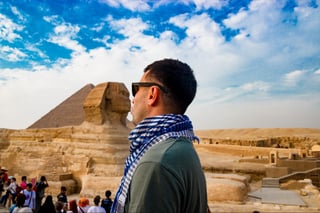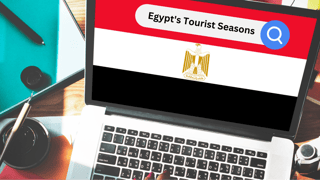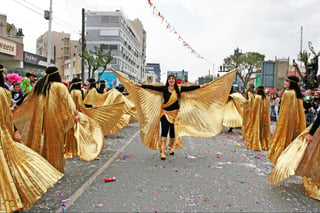Egypt, with its rich historical heritage, draws travellers to ancient temples and monuments that whisk them through time. A globally renowned tourist destination, it's celebrated for its historical treasures.

Furthermore, Egypt's natural wonders include Nile river cruises, Sahara dune adventures, and exploration of the Suez Canal. To optimise your journey, it's essential to choose the right time to visit and secure the necessary Egypt Visa, a process made convenient through the official online app.
Egypt's Climate: A Year-Round Delight
Egypt boasts a climate that offers favourable conditions throughout the year. This predominantly arid country experiences minimal rainfall annually, making umbrellas more useful for shade from the sun rather than protection from rain.
-
Embracing Egypt's Mild Winter Season
Egypt's mild winter season offers a welcome respite from the scorching heat of summer, making it an ideal time to visit this fascinating country.
Here are some additional points to consider:
- Winter is a great time to visit Egypt's beaches. The Red Sea Riviera and the North Coast are both popular destinations for swimming, sunbathing, and snorkelling. The water temperature remains comfortable throughout the winter months, making it a great time to enjoy the beach without the crowds of summer.
- Winter is also a good time to visit Egypt's deserts. The weather is mild and sunny, making it ideal for camel safaris, sandboarding, and other desert activities.
- Winter is a great time to visit Egypt's oases. These lush oasis towns offer a welcome respite from the desert heat and provide a chance to experience traditional Egyptian culture.
- Winter is a good time to visit Egypt's festivals. The Abu Simbel Sun Festival, held on October 22 and February 22, is one of the most popular festivals in Egypt. Other popular winter festivals include the Cairo Jazz Festival and the El Gouna Film Festival.
Here are some tips for making the most of your winter visit to Egypt:
- Pack light clothing for daytime wear. You can always add a layer or two if you get cold at night.
- Be sure to pack a warm jacket for nights and early mornings.
- Bring sunscreen, sunglasses, and a hat to protect yourself from the sun.
- Drink plenty of water to stay hydrated.
- Be aware of the cultural differences in Egypt and dress appropriately.
-
Experiencing the Scorching Egyptian Summer
Egypt's summer season is a stark contrast to its mild winters, with scorching temperatures that can easily reach 40 degrees Celsius (104 degrees Fahrenheit) and even higher. The summer months typically extend from May through September, with August being the hottest month.
Despite the extreme heat, Egypt remains a popular tourist destination during the summer months. Many visitors are drawn to the lower prices and fewer crowds. Additionally, Egypt's Red Sea coast offers a welcome respite from the heat, with its pristine beaches and crystal-clear waters.
Here are some additional points to consider:
- If you're planning a summer trip to Egypt, it's important to be prepared for the heat. Pack light, comfortable clothing, sunscreen, sunglasses, and a hat. Drink plenty of water throughout the day and avoid strenuous activity during the hottest part of the day.
- Some of the best places to visit in Egypt during the summer include the Red Sea coast, the North Coast, and the Nile Valley. These destinations offer a variety of activities, such as swimming, sunbathing, snorkelling, diving, and sightseeing.
- If you're visiting Egypt during the summer, it's important to be aware of the cultural sensitivities. Dress modestly and avoid public displays of affection.
-
Exploring Egypt's Enchanting Spring and Autumn
Egypt offers the beauty of spring during March and April, and the charms of autumn in October and November. To savour Egypt's delightful weather, consider planning your trip for these transitional seasons.
As March progresses into April, Egypt witnesses the arrival of the 'Khamsin' wind, originating from the southern desert, which circulates hot air. During spring, temperatures generally range from 11 to 28 degrees Celsius, while autumn sees temperatures between 21 to 33 degrees Celsius.
The moderate daytime climate in spring and autumn opens up a world of opportunities for various activities and day trips. Notably, these seasons fall between Egypt's peak and off-peak touristperiods, offering a chance to enjoy discounted Egypt tours.
Navigating Egypt's Tourist Seasons
Egypt's tourist seasons can be categorised into three distinct phases: high, low, and shoulder seasons, each offering a unique perspective on the country's climate.

- High Season
The peak tourist influx in Egypt occurs during October and February, precisely when the weather is most inviting for sightseeing. October signals the arrival of autumn, heralding the approach of a pleasant winter. Meanwhile, February and March usher in spring, creating optimal conditions for exploring Egypt without the sweltering heat.
This mid-October to mid-February period is when a significant portion of tourists converge on Egypt. Consequently, popular attractions such as the Pyramids of Giza, Cairo, and the Valley of the Kings tend to be crowded during these months.
- Low Season
Egypt's low tourist season extends from May to August, coinciding with the scorching summer. The searing sun makes outdoor activities less enjoyable, and thus, this period registers a notable decline in tourist numbers.
- Optimal Timing
For an Egypt visit that combines pleasant weather and fewer crowds, consider planning your trip during the shoulder seasons, spanning from March to May and September to October. During these times, you can relish Egypt's amiable climate without contending with large throngs of tourists. Hotel availability is also more accommodating, with no need for months of advance booking.
Ideal Months for Travelling in Egypt
The ideal time to explore Egypt is arguably during February and March. These months promise warm and sunny weather, especially in the southern regions, where numerous ancient sites are concentrated. Additionally, October and early November offer a favourable window for travel with manageable climate conditions and fewer crowds.
- Weather in Egypt in January
January in Egypt boasts mild temperatures, with daily averages spanning from 12°C to 22°C. While the days are pleasant, it's advisable to carry a light jacket for the evenings.
- Weather in Egypt in February
February marks the transition to spring, bringing higher temperatures than January. Daily averages typically range from 13°C to 23°C, making it an ideal time for activities such as hiking in the Sinai High Mountains and the Western Desert.
- Weather in Egypt in March
In March, Egypt begins to heat up, with daily maximum temperatures averaging around 28°C and nighttime lows at 17°C. Rainfall is rare, and heading to Cairo can further reduce the chances of encountering rain.
- Weather in Egypt in April
April in Egypt mirrors the conditions of March but witnesses daytime temperatures rising to an average of 31°C by the end of the month, with nighttime temperatures ranging between 17°C and 21°C. Hurghada offers extended sunny days, with up to 13 hours of daylight.
- Weather in Egypt in May
While May still offers tolerable heat, many affluent Egyptians migrate to coastal resorts towards the month's end. Tourists may find May a delightful time to visit Egypt, especially for enjoying the sun and sea.
- Weather in Egypt in June
June sees scorching temperatures in the south and the desert regions, with readings that can reach up to 40°C. Pollution in Cairo also tends to increase. For those sensitive to high heat, destinations like Hurghada or Sharm El Sheikh might be preferable.
- Weather in Egypt in July
July continues with extremely high temperatures, averaging a daily maximum of 39°C and a daily minimum of 29°C. However, some coastal areas like Sharm El Sheikh offer relatively cooler temperatures and balmy seas.
- Weather in Egypt in August
August retains the scorching conditions seen in June and July. It's not the most suitable time for exploring ancient sites but is excellent for Nile cruises and water-based activities such as snorkelling and diving.
- Weather in Egypt in September
September brings a gradual drop in temperatures, making it more comfortable for exploring ancient sites. Daily maximums hover around 37°C, with minimums of 27°C. A jacket is unnecessary, but the climate becomes more manageable.
- Weather in Egypt in October
October is considered one of the finest months to visit Egypt, as the average daytime temperature drops to around 30°C. The Western Desert Oases are abuzz with the date harvest during this period.
- Weather in Egypt in November
November is an excellent month for travellers, offering bearable heat with an average daily maximum of 28°C and a minimum of 19°C. However, it marks the beginning of Egypt's peak tourist season.
- Weather in Egypt in December
December brings cooler evenings, requiring a jumper. Nonetheless, the daytime temperatures remain comfortable, with an average daily maximum of 24°C and a minimum of 14°C. It's also Egypt's rainiest month, drawing significant crowds.
Exploring Egypt's Abundant Sights and Activities
Egypt is a treasure trove of attractions, offering a wide array of places to visit and activities to partake in. While listing them all is a formidable task, here are a few destinations to consider when crafting your itinerary.
- Giza: No Egypt journey is complete without a visit to the iconic Pyramids of Giza. Plan a full day to immerse yourself in the history and grandeur of these magnificent structures.
- Cairo: Egypt's bustling capital invites exploration, where you can marvel at historical landmarks, mosques, churches, and libraries. Don't forget to indulge in the vibrant shopping opportunities.
- Luxor: Luxor beckons with its rich offerings, from the awe-inspiring Temple of Karnak and the historic Valley of the Kings to the serenity of a Felucca Ride to Banana Island. It's an Egypt must-visit.
- Aswan: Often underrated, Aswan captivates with its scenic beauty and historical significance, including the grand monuments of Abu Simbel.
- Sharm-el-Sheikh: For a summer retreat, look no further than this resort town, nestled between the Sinai Peninsula's desert and the Red Sea. It's a haven for beach lovers, snorkelers, and swimmers.
- Mount Sinai (Jabal Musa): Offering some of Egypt's most breathtaking scenery, Mount Sinai is a hiker's paradise. Explore the trailhead at the monastery car park, venture the camel trail, or ascend the Steps of Repentance.
- Alexandria: Egypt's second-largest city, with its coastal location along the Mediterranean Sea, boasts attractions like the legendary Bibliotheca Alexandrina, the Antiquities Museum, and the relaxing Mamoura Beach.
- Hurghada: This beach resort town is renowned for scuba diving, as well as its culinary delights, bars, and vibrant nightlife. Explore the traditional Egyptian coffee shops and souks in the old town, El Dahar.
- Nile Cruise: Embark on ab. This unique journey along the Nile River takes you across the country's historical heart.
- Siwa Oasis: Escape the urban hustle and unwind in this oasis. Explore the Shali Fortress, wander the mountain of the dead's tombs, take a dip in salty lakes, and savour the tranquillity of this hidden gem in Egypt.
Festivals and Holidays in Egypt
Egypt's calendar is rich with cultural and religious celebrations, often following the Islamic lunar calendar, making the dates vary each year concerning the Western calendar. Additionally, it's essential to remember that days in the Islamic calendar start at sundown, affecting the timing of Islamic festivals.

- Ramadan
During the sacred month of Ramadan, which aligns with the ninth month of the Islamic calendar, the majority of Egyptians, about ninety percent, observe fasting. This practice involves abstaining from food, drink, smoking, and intimate relations from dawn to sunset. While this can pose some challenges for travellers, the evenings during Ramadan are marked by joyous festivities, music, and warm hospitality.
- Islamic Holidays
Eid al-Fitr, which marks the end of Ramadan, and Eid al-Adha (also known as Eid al-Kabir or Kurban Bairam), celebrate significant events in Islamic history. Eid al-Adha commemorates Abraham's willingness to obey God by sacrificing his son and is followed by Ras al-Sana al-Hegira, the Muslim new year, on the first day of Muharram. Another important Islamic celebration is Moulid al-Nabi, observing the birthday of the Prophet Mohammed and featuring processions in many towns and cities.
- Moulids
Moulids, akin to mediaeval European saints' fairs, are events that blend piety, entertainment, and commerce. They aim to seek blessings from local saints, offering opportunities for friends and families to gather. While most moulids align with the Islamic calendar, a few adhere to particular days or occur around the local harvest time. These festivals are occasions to experience Egyptian popular culture at its liveliest. Some draw enormous crowds, with stalls, rides, and music lasting into the early hours. The biggest moulids are typically found in Cairo, Tanta, and Luxor.
- Coptic Festivals
Egypt's Christian Copts often participate in Islamic moulids, and vice versa. Coptic moulids serve similar functions to their Islamic counterparts and typically commemorate a saint's name-day. Major Coptic festivals, adhering to the old Julian calendar, include Christmas on 7th January, Epiphany on 19th January, and the Annunciation on 21st March. Additional significant Coptic saints' days include the Feast of the Apostles Peter and Paul (12th July), various moulids of the Virgin, and St. George celebrated in August. Coptic Easter Monday is marked by a festival of pharaonic origin called Sham el-Nessim, symbolising the arrival of spring and promoting mass picnics throughout Egypt's parks and riverbanks.
FAQS
What is the best time to visit Egypt for pleasant weather?
The best time for pleasant weather in Egypt is during the shoulder seasons, which are from March to May and September to October. During these periods, you can enjoy milder temperatures and fewer crowds.
When is the high tourist season in Egypt?
Egypt's high tourist season occurs from mid-October to mid-February. This is when many visitors flock to popular attractions like the Pyramids of Giza, Cairo, and the Valley of the Kings.
When is the low tourist season in Egypt?
Egypt's low tourist season runs from May to August. The scorching summer heat deters many tourists from visiting during this time.
How does Ramadan affect travel to Egypt?
Ramadan is a sacred month in Egypt when many Muslims fast from dawn to sunset. Travellers may find that some services and eateries are closed during the day, but the evenings come alive with festivities. It's a unique cultural experience, but be considerate about not eating or smoking in public during fasting hours.
What are some key Egyptian festivals and holidays?
Egypt celebrates several festivals, including Eid al-Fitr and Eid al-Adha, marking the end of Ramadan and the willingness of Abraham to sacrifice his son, respectively. Moulid al-Nabi observes the Prophet Mohammed's birthday. Coptic festivals, following the Julian calendar, include Christmas, Epiphany, and the Feast of the Apostles Peter and Paul. Additionally, Moulids are local events combining piety and entertainment, and Sham el-Nessim is a spring festival celebrated by all Egyptians.
What is the weather like during Egypt's summer season?
Egypt's summer season, from May to August, is scorching hot. Daytime temperatures can be extreme, and outdoor activities can be less enjoyable due to the heat.
What is the significance of the shoulder seasons in Egypt?
The shoulder seasons, spanning from March to May and September to October, offer a perfect balance of pleasant weather and fewer crowds. It's an ideal time for travellers to explore Egypt without the extremes of high or low tourist seasons.
Like
Dislike
To obtain a Egypt eVisa
- Step1: Complete the online application by providing your passport details.
- Step2: Submit payment online using a credit card.
- Step3: Monitor your email for confirmation of payment and receipt of your eVisa, which will be sent electronically.

Comment